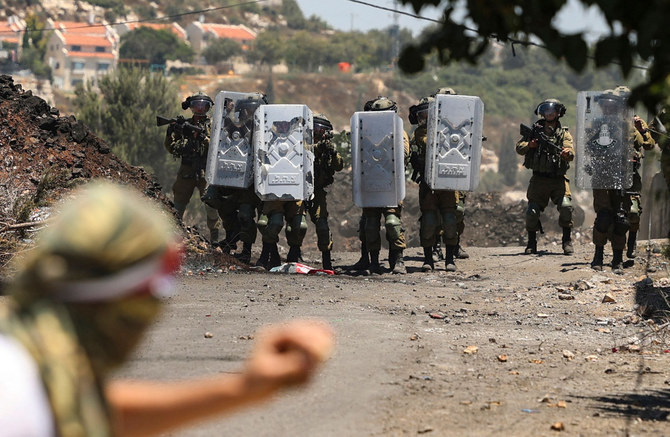RAMALLAH: Political analysts were on Friday split over the next diplomatic moves for Palestinian President Mahmoud Abbas following his recent talks with the leaders of France and America.
Abbas held discussions with US President Joe Biden in Bethlehem on July 15 and then spoke to President Emmanuel Macron in Paris on July 20.
General disappointment with the outcome of the Biden talks saw the Palestinian leadership turn its attention toward the EU.
During his meeting with Abbas, Biden reportedly said that the conditions were not currently suitable to relaunch the Palestine-Israel peace process. As a result, he failed to propose any plan to end the Israeli occupation and took no position on the matter of the expansion of Israeli settlements in the West Bank.
Macron, meanwhile, promised Abbas that he would help revive the stalled peace track between the Palestinians and Israelis, and pressure Israel to stop its settlement activities in the West Bank, while providing political and financial support for the Palestinians to overcome a UN Relief and Works Agency financial crisis, and the impact of international food shortages.
Speaking at a joint press conference with Macron in the French capital on Wednesday, Abbas said: “We count on President Macron’s role in launching the necessary initiatives and moves to push peace efforts in our region forward, in cooperation with the concerned European and Arab parties.”
And Macron urged the need for, “the resumption of direct political dialogue between the Israelis and the Palestinians. It is a difficult road, full of bumps, but we have no alternative to reviving our efforts for peace.”
However, with 87-year-old Abbas still considered by some experts to believe that the cards for a solution to the Palestinian issue remain in the hands of the US only, his next diplomatic move is proving difficult to predict.
Mustafa Barghouthi, a Palestinian politician, told Arab News that any Palestinian attempt to search for a solution through Europe and wait for the help of others may not work.
He said: “We must end the internal Palestinian division, hold free elections, unite on the strategy of activating popular resistance, review the functions of the Palestinian Authority, strengthen the role of the Palestine Liberation Organization, and rebuild the movement of international solidarity with the Palestinian people.”
He pointed out that while strengthening relations with the EU, China, and Russia could be helpful, the most crucial factor was, “the change in the balance of power on the ground and the escalation of popular resistance against the Israeli occupation.”
Ghassan Al-Khatib, a Palestinian political analyst, felt that Abbas’ approach to France and other EU countries was an important step because Palestinian diplomacy should not allow the US to continue monopolizing the Palestinian-Israeli conflict.
On Biden, he told Arab News: “He did not fulfil his promises to the Palestinian Authority during his election campaign, and this must reflect itself in the Palestinian foreign relations with the European Union, Russia, and China.”
George Noll, head of the Palestinian Affairs Unit at the US Embassy in Jerusalem, on Thursday told Palestinian journalists in Ramallah that Abbas had presented a long list of demands to Biden during their meeting. In response, according to a senior US official, the American president said: “These are things that need Christ, the miracle-maker, to accomplish.”
Al-Khatib said: “The statement of the US official is rude because what President Abbas requested is related to the application of the rules of international legitimacy, such as ending the occupation, stopping settlements, and helping Palestinian refugees through the UNRWA.”
He noted that, if true, such a stance by the Biden administration belittled the internationally legitimate demands regarding the Palestinian cause.
“This means that the US has put itself in Israel’s pocket about the Palestinian-Israeli conflict, and this is enough reason for the Palestinian Authority to consider the US as an unfair sponsor and is looking for supporters with global influence such as the European Union, Russia, and China,” he added.
The EU has expressed its concerns over the announcement of settlers’ plans to establish several new outposts in the occupied West Bank.
In a statement on Thursday, it said that 150 illegal settlement outposts in the West Bank often contributed to the establishment or expansion of Israeli settlements and were a potential direct source of increased violence by settlers toward Palestinians.
It added that the settlements and outposts were illegal under international law and constituted a significant obstacle to achieving a two-state solution.
On Thursday, the Palestinian Applied Research Institute said that the Israeli occupation authorities had published three new plans for more settlements in different locations in the West Bank, under which an area of 733.6 dunums (181.2 acres) of Palestinian land would be seized.
The Israeli settlements occupy 201 square kilometers (3.6 percent of the occupied West Bank) and are inhabited by around 700,000 Israeli settlers.






















